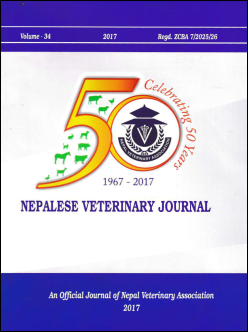Commercial Fattening of Buffalo Calves for Economic Meat Production
DOI:
https://doi.org/10.3126/nvj.v34i0.22903Keywords:
Fattening, dry matter, buffaloAbstract
An experiment was conducted on buffalo calves at Livestock farm of Regional Agriculture Research Station, Khajura, Nepal aiming to strengthen practice of commercial fattening. Experiment was done for a period of 7 months during the year 2015 with the main objective to develop low cost buffalo fattening technology emphasizing feeding management. Sixteen male buffalo calves aged 10-12 months were purchased from livestock haat bazaar at Rambhapur, Banke district and from farmers' field. The experiment was conducted in a Randomized Complete Block Design with 4 treatments each replicated four times. The treatment details were T1: Control- Farmer's practice, T2: Feed 1 + roughage adlib (straw and green at 3:1 ratio), T3: Feed 2 (Urea 2% and molasses 10 % of concentrate) + roughage ad lib (straw and green at 3:1 ratio),T4: Feed 3 (Oil seed cakes 20 %, soybean cake 10 %, urea 1%, Molasses 5 % of concentrate) + roughage ad lib (straw and green at 3:1 ratio). The dry matter requirement was fulfilled at the rate of 3 % of body weight. The concentrate was supplied at the rate of 25 % of total dry matter requirement and rest were fulfilled from roughages i.e straw and green forage at the ratio of 3:1. The buffalo calves were vaccinated against FMD and HS. Drenching was done at the beginning and during middle of the experiment. The results showed that the significantly higher average daily gain (g) was found for T2 (508.34 g) followed by T4 (503.57). Based on economic analysis the net benefit per animal was found highest on T3 i.e urea molasses supplemented group without soybean cake supplementation Rs 2853.
Downloads
Downloads
Published
How to Cite
Issue
Section
License
© Nepal Veterinary Association




